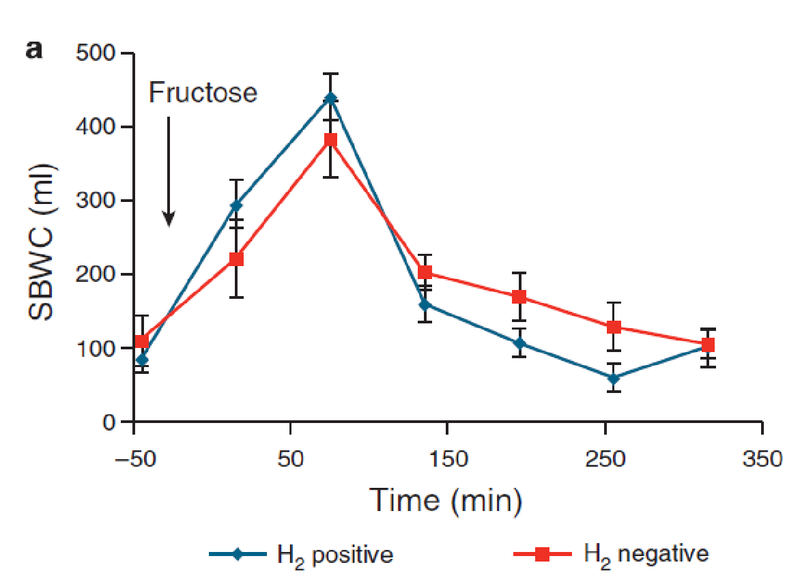Background-
New research regarding breath testing and its use to diagnose fructose malabsorption in IBS has just been published. Researchers examined existing data from several prospective clinical trials involving two groups of IBS patients to see if fructose breath test results were the same when repeated over time.1 The studies also investigated reporting of gastrointestinal symptoms during fructose breath testing and the relationship between test outcome (‘positive’ or ‘negative’ for fructose malabsorption) and the experience of symptoms.1
Study 1 - 41 IBS patients - two fructose breath tests performed, with the second test completed ≥2 weeks after the first
Study 2 - 36 IBS patients - completed a single fructose breath test and kept gastrointestinal symptom diaries the day before and the day of the test
Patients in both studies followed a diet low in fibre and FODMAPs for 24 hours and were required to fast overnight prior to each breath test. Participants consumed a drink containing 35g of fructose in 200ml of water for each test and breath samples were collected every 15 or 20 minutes for up to four hours.
Results-
Study 1 – is a fructose breath test result reproducible?
Major findings-
- 30% of participants, positive for fructose malabsorption in their first breath test, tested negative on the subsequent test ≥2 weeks later
- The was no relationship between the amount of breath hydrogen produced in the first and second fructose breath tests
Study limitations-
- Some study 1 participants had their second breath test performed >19 weeks after the first. This relatively long period of time between tests means that changes in diet or medications may have affected gut bacterial populations and therefore influenced the results.
- This study included a small number of participants and retrospectively analysed data from existing studies. A larger, prospective study that collects data over a longer test period would be useful to further validate these findings.

Study 2 – are symptoms on a breath test related to breath hydrogen response?
Major findings-
- Those who tested ‘positive’ for fructose malabsorption were more likely to report symptoms during a fructose breath test than those who tested ‘negative’
- This was NOT significant when test day symptom scores were adjusted to account for the participants’ usual level of symptoms (pre-test day symptom scores)
Study limitations-
- Gastrointestinal symptom data from study 2 was only collected during the breath-testing period and not the remainder of the day, so may not have captured participants who had a delayed symptom response.
Further data-
In 2013, a group of researchers in the UK conducted a study looking at the effects of fructose in the gut.2 They were examining the osmotic effect of fructose (how much water fructose moves through the gut) and did this using superior MRI technology. They demonstrated some very interesting findings:
- Fructose has an osmotic effect, delivering water through the small intestine
- Fructose has this effect regardless of whether the person has a positive or negative fructose breath test
- The authors conclude – fructose has an osmotic effect and this does not depend on breath test outcomes
- Clinical significance – a fructose breath test is not helpful in identifying fructose as a trigger.
This figure demonstrates the increase in small bowel water content (SBWC) seen on consumption of fructose in individuals with a positive fructose breath test (blue) and a negative fructose breath test (red).2 You can see there is no difference. Fructose increases SBWC regardless of breath test outcomes.
Take home messages-
- Fructose breath test results are not reproducible, i.e. you can have a positive breath test one day, and can have a negative breath test just weeks later
- There seems to be a poor correlation between fructose breath test outcome (i.e. a ‘positive’ or ‘negative’ result for malabsorption) and the experience of symptoms in individuals with IBS
- Fructose can contribute to symptoms regardless of whether a breath test is positive or negative
- The results of this and previous research DO NOT support the use of routine fructose breath tests for the diagnosis of fructose malabsorption or to guide management in people with IBS.
References:
- Yao CK, Tuck C, Barrett J, Canale K, Philpott H, Gibson P. Reproducibility of lactulose and fructose breath hydrogen testing and impact on clinical utility. Journal of Nutrition & Intermediary Metabolism. 4:29.
- Murray K, Wilkinson-Smith V, Hoad C, Costigan C, Cox E, Lam C, et al. Differential effects of FODMAPs (fermentable oligo-, di-, mono-saccharides and polyols) on small and large intestinal contents in healthy subjects shown by MRI. The American journal of gastroenterology. 2014;109(1):110-9.

